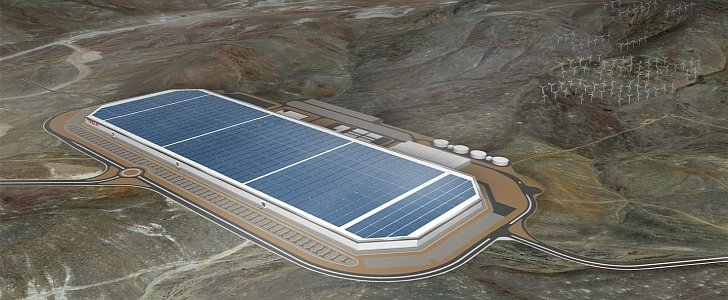It sure seems like the demand for lithium-ion batteries is going to surge over the next few years. Otherwise, all these people building their huge and very expensive plants will look really foolish.
On the one hand, you have Tesla, the company that started it all with the factory in Nevada that has come to be known as the Gigafactory. Elon Musk's company is guilty of driving demand up as well, considering how it is now getting ready to ship up to 500,000 electric vehicles a year by 2018.
But others have similar plans as well. Mercedes-Benz has launched its EQ brand for alternative mobility and is expected to release a few capable electric vehicles of its own in no more than two years. Since the batteries make up a large part of an electric vehicle's production cost, the companies see no reason in giving all that money to a third-party supplier, so they're very much willing to build them themselves.
Daimler has just announced the construction of a battery plant near Berlin, in Germany, an investment that's going to set the company back for around $600 million. It won't be the biggest battery factory in the world, then, but it will be largest in Europe when it's done.
Volkswagen is another carmaker with big electric plans. Unlike Tesla, it already has production capabilities over in China, which is still the world's biggest EV market. Together with Anhui Jianghuai Automobile Group (JAC Motor), the Germans have just had a $730 million deal approved that would see them build 100,000 EVs there.
With almost every traditional manufacturer ready to release at least one fully-electric model before 2020, if not a whole range of them, lithium-ion battery cells are most likely not going to be left on the shelves. In fact, there might even be a penury.
Not if more companies like Energy Absolute Pcl have anything to say about it. The Thailand-based solar projects specialist announced it is ready to invest $2.9 billion in the construction of a battery plant that would have a yearly output of 50 GWh.
Talking to Bloomberg, company CEO Amorn Sapthaweekul said the final location had not been decided yet, but he hoped it would be somewhere in Thailand. “We will choose just one location for the manufacturing plant," he said. "We would prefer to have the plant in Thailand, which will be beneficial for the country’s development. Still, we need to see clear government policy.”
The plan is to announce the location by the end of next month and have a section of the plant up and running before the end of next year. That's a pretty tight schedule, but we've become used to the speed with which things are happening now.
Lithium-ion batteries have long been associated with mobile devices like phones and laptops, and then electric vehicles, but a new market is opening up for them: stationary power storage units for domestic and industrial use. No, there is absolutely no risk of having too many battery factories any time soon.
But others have similar plans as well. Mercedes-Benz has launched its EQ brand for alternative mobility and is expected to release a few capable electric vehicles of its own in no more than two years. Since the batteries make up a large part of an electric vehicle's production cost, the companies see no reason in giving all that money to a third-party supplier, so they're very much willing to build them themselves.
Daimler has just announced the construction of a battery plant near Berlin, in Germany, an investment that's going to set the company back for around $600 million. It won't be the biggest battery factory in the world, then, but it will be largest in Europe when it's done.
Volkswagen is another carmaker with big electric plans. Unlike Tesla, it already has production capabilities over in China, which is still the world's biggest EV market. Together with Anhui Jianghuai Automobile Group (JAC Motor), the Germans have just had a $730 million deal approved that would see them build 100,000 EVs there.
With almost every traditional manufacturer ready to release at least one fully-electric model before 2020, if not a whole range of them, lithium-ion battery cells are most likely not going to be left on the shelves. In fact, there might even be a penury.
Not if more companies like Energy Absolute Pcl have anything to say about it. The Thailand-based solar projects specialist announced it is ready to invest $2.9 billion in the construction of a battery plant that would have a yearly output of 50 GWh.
Talking to Bloomberg, company CEO Amorn Sapthaweekul said the final location had not been decided yet, but he hoped it would be somewhere in Thailand. “We will choose just one location for the manufacturing plant," he said. "We would prefer to have the plant in Thailand, which will be beneficial for the country’s development. Still, we need to see clear government policy.”
The plan is to announce the location by the end of next month and have a section of the plant up and running before the end of next year. That's a pretty tight schedule, but we've become used to the speed with which things are happening now.
Lithium-ion batteries have long been associated with mobile devices like phones and laptops, and then electric vehicles, but a new market is opening up for them: stationary power storage units for domestic and industrial use. No, there is absolutely no risk of having too many battery factories any time soon.

